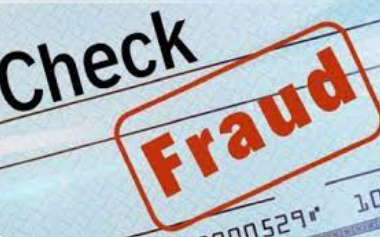In an era dominated by digital transactions and online banking, it’s easy to assume that traditional forms of payment, such as checks, have become obsolete. However, the reality is quite the contrary. Despite the prevalence of electronic payment methods, checks are widely used in various financial transactions. Unfortunately, with the persistence of checks comes the persistent threat of check fraud.
Check fraud, particularly check washing, has been on the rise in recent years, posing significant challenges for individuals, businesses, and financial institutions alike. Criminals are employing increasingly sophisticated methods to steal checks, alter their details, and fraudulently cash them, leaving victims grappling with financial losses and reputational damage.
Check washing, in particular, is a technique where criminals erase the ink from a legitimate check using common household chemicals, such as acetone, leaving behind a blank canvas that they can alter to their advantage. By altering the payee’s name, the amount, and other details, fraudsters can cash the check or deposit it into their own accounts, often without arousing suspicion.
The implications of check fraud are far-reaching. Businesses can suffer significant financial losses, legal ramifications, and damage to their reputation if they become victims of fraudulent activities. Moreover, individuals may find themselves grappling with unauthorized transactions, identity theft, and disruptions to their financial stability.
Amidst the escalating threat of check fraud, it has become imperative for individuals and businesses to adopt proactive measures to safeguard against such illicit activities. One of the most effective solutions in this regard is the implementation of Positive Pay.
Positive Pay is a fraud prevention service offered by many banks and financial institutions. It works by requiring businesses to submit electronic files containing details of the checks they issue, including the check number, amount, and payee information before the checks are presented for payment. When a check is presented for payment, the bank cross-references the details provided by the account holder with the information on the presented check. If any discrepancies are identified, such as a mismatch in the check number, amount, or payee information, the transaction is flagged for review, and the account holder is notified for verification.
The beauty of Positive Pay lies in its ability to detect and prevent fraudulent checks before they are honored by the bank. By leveraging technology and real-time data verification, Positive Pay provides a robust defense against check fraud, helping businesses and individuals mitigate risks and safeguard their financial assets.
In addition to Positive Pay, there are several other best practices that individuals and businesses can adopt to enhance their defenses against check fraud:
- Secure Check Issuance: Implement strict protocols for issuing and handling checks, including storing blank checks in a secure location, limiting access to authorized personnel, and reconciling accounts regularly.
- Educate Employees and Customers: Raise awareness among employees and customers about the risks of check fraud, including common tactics used by fraudsters and the importance of vigilance when issuing or receiving checks.
- Monitor Account Activity: Regularly monitor account activity for unauthorized transactions or suspicious patterns that may indicate fraudulent activity. Promptly report any discrepancies to your financial institution.
- Embrace Technology: Explore the use of advanced technologies, such as encryption, biometric authentication, and fraud detection algorithms, to enhance the security of your financial transactions and data.
In conclusion, check fraud, particularly check washing, continues to pose a significant threat to individuals, businesses, and financial institutions. As criminals become more sophisticated in their tactics, stakeholders need to remain vigilant and proactive in implementing effective fraud prevention measures. Positive Pay emerges as a leading solution in this battle against check fraud, offering a robust defense mechanism that leverages technology and real-time data verification. By embracing best practices and leveraging innovative solutions, individuals and businesses can fortify their defenses and minimize the risk of falling victim to check fraud in an increasingly digital world.




